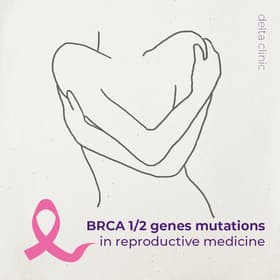BRCA 1/2 genes mutations in reproductive medicine

Breast cancer can be inherited, and we currently know several variants of gene mutations responsible for such inheritance. BRCA1 and BRCA2 are the most common ones.
Testing these genes mutations is usually recommended in the following cases:
1) There’s at least one case of breast cancer or invasive epithelial ovarian cancer in the family, i.e. first degree relatives under 50.
2) There were 2 or more cases of breast cancer, prostate cancer or pancreatic cancer in the family.
In case a mutation is found, the usual periodic screenings have to start earlier and include more examinations. It is also recommended to bear a child as early as possible or at least freeze one’s oocytes before the age of 30-35 (ideally). There are a number of preventive surgeries recommended throughout the world in such cases, which reduce the risk of oncology.
It sounds quite simple, if one gets pregnant easily. However, what should a woman do if she is planning an IVF program or oocytes banking? How safe is that? Frankly, we do not have a 100% clear answer to that yet. Most studies have not found any bad influence of hormonal ovarian stimulation on oncology risks for women with BRCA 1 or BRCA2 mutations. However, the amount of such studies is still quite moderate, as well as their volume. So, one can appeal to IVF in such cases but should be extra careful.
Before starting an IVF cycle, one is recommended to have a mammography (over the age of 30) or contrast-enhanced breast MRI (which is more conclusive). If the program has been successful, one should have breast ultrasound during the second trimester of pregnancy as well. In such cases, I consider it quite reasonable to carry out the same stimulation schemes of fertility preservation as for patients with hormone-sensitive cancers (using letrozole). This stimulation should not cause any estrogen increase. And this is exactly what we need to secure the safety of our patients.
The article is written by Dr. Inga Gorelova - fertility specialist, the head of ART department in Delta Fertility Clinic.